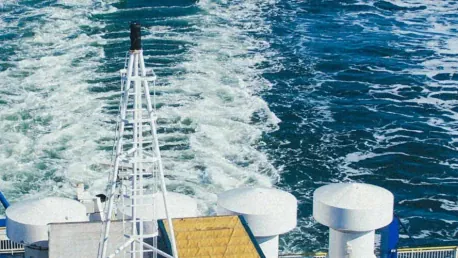The International Maritime Organization (IMO) has embarked on a comprehensive strategy to achieve climate neutrality in shipping, focusing on reducing greenhouse gas (GHG) emissions. Aiming to address the urgent global issue of climate change, the IMO is leading a transition towards sustainable maritime practices with the ultimate goal of net-zero emissions by 2050. This ambitious roadmap is not just a vision but a structured plan featuring concrete targets, timelines, and milestones designed to steer the global maritime industry towards an environmentally sustainable future.
Ambitious Targets Set for Reduction of GHG Emissions
The IMO has established concrete targets to systematically reduce the carbon footprint of international shipping. By 2030, the organization intends to reduce carbon intensity by at least 40% relative to 2008 levels. Additionally, at least 5% of the energy used by international shipping should come from zero or near-zero GHG emission technologies, fuels, and energy sources. Moving beyond 2030, the organization aims to achieve even steeper reductions, with a 70% cut in GHG emissions by 2040, ultimately progressing to net-zero emissions by 2050.
This ambitious plan necessitates technical innovation and the global introduction of alternative fuels and energy sources. The transition to sustainable maritime practices will also require building capacity to support developing countries, ensuring that no nation is left behind. The ultimate aim is a coordinated international effort to decarbonize shipping, with the IMO playing a central role in orchestrating and regulating this transition. The focus on sustainable energy sources and technologies underscores the urgency of the climate challenge and the significant role that the maritime sector must play in addressing it.
Progress in Regulatory Frameworks by MEPC
The 81st session of the Marine Environment Protection Committee (MEPC 81) marked significant progress in shaping the necessary regulatory frameworks and guidelines to enhance energy efficiency and manage marine fuels. Vital milestones were achieved, laying the groundwork for further advancements at MEPC 82, scheduled for 30 September to 4 October 2024, to build upon these initial steps. The progress in MEPC 81 demonstrates the IMO’s commitment to robust regulatory action aimed at reducing GHG emissions from maritime operations.
Prior to MEPC 82, the Intersessional Meeting of the Working Group on Reduction of GHG Emissions from Ships (ISWG-GHG) will convene for its 17th session in London from 23 to 27 September 2024. The outcomes and report from this meeting will be crucial for MEPC 82, influencing the development of future regulations. These sessions are expected to address various strategies and measures, setting the stage for the adoption of regulations that will drive the maritime industry towards the IMO’s 2050 net-zero emissions target.
Draft Amendments to MARPOL Annex VI
In a significant move, several draft amendments to MARPOL Annex VI have been introduced to form an integrated IMO Net Zero Framework. Notable among these is a proposal submitted by the Bahamas and Liberia, co-authored by the International Chamber of Shipping (ICS), which outlines a revised approach to carbon pricing. This proposal integrates a simplified goal-based fuel standard and a distinct maritime GHG emissions pricing mechanism, designed to accelerate the industry’s transition to sustainable energy practices.
The proposed system includes an initial flat rate GHG fee per tonne of CO2 emitted, with a suggested fee of USD 18.75 or USD 60 per tonne of conventional fuel oil. To stimulate the adoption of zero or near-zero GHG fuels, a feebate (reward) mechanism has been suggested. This system is expected to incentivize the reduction of CO2 emissions by financially rewarding the use of sustainable technologies and energy sources. The projected outcome is significant financial support directed towards developing countries, fostering an inclusive global transition.
Impact on Global Shipping and Developing Nations
The proposed amendments project an allocation of up to USD 2.5 billion per year into an “IMO Net Zero Shipping Fund.” This fund is designed to support the development needs of developing countries, facilitating a global and equitable transition to sustainable shipping practices. Ensuring no nation is left behind, the fund will be pivotal in driving the production and uptake of sustainable technologies and energy sources, thereby contributing to global environmental goals.
Moreover, the draft amendments focus on treating life cycle emissions—debating between well-to-wake and tank-to-wake emissions—to provide a holistic assessment of emissions throughout the entire fuel life cycle. Addressing the entire lifecycle of fuels is essential for achieving meaningful GHG emission reductions. This thorough approach ensures that emissions are meticulously accounted for, from production to consumption, thereby providing a comprehensive pathway to improving environmental performance.
Addressing Double Charging and Regulatory Alignment
The International Maritime Organization has launched a detailed strategy to achieve climate neutrality in the shipping sector, with a primary focus on curbing GHG emissions. Recognizing the critical global challenge posed by climate change, the IMO is pioneering a shift towards sustainable maritime operations with the ultimate objective of reaching net-zero emissions by 2050. This bold initiative is not merely an aspirational vision; it is a meticulously crafted plan that includes specific targets, timelines, and key milestones to guide the global maritime industry toward an environmentally sustainable future.
The IMO’s strategy encompasses a range of measures, including the adoption of cleaner fuels, the development of energy-efficient technologies, and the implementation of best practices aimed at reducing the carbon footprint of shipping activities. By setting forth a clear and actionable framework, the organization is working to ensure that the maritime industry can continue to play a vital role in global trade while minimizing its environmental impact. This initiative is a significant step forward in the global effort to combat climate change and promote sustainability.









